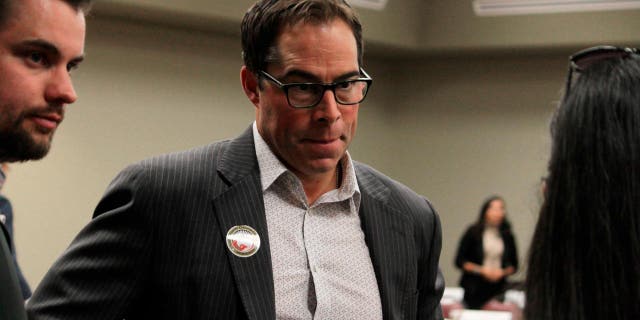$1.231 Billion Recovery Sought From 28 Oil Companies: Representatives' Pledge

Table of Contents
The Scale of the Environmental Damage and the $1.231 Billion Demand
The environmental damage caused by these oil companies is extensive and devastating. Reports detail multiple significant oil spills, widespread pollution affecting both land and marine ecosystems, and long-term consequences for wildlife and human communities. The precise locations and specifics of each incident are currently under legal review, but the collective impact is undeniable.
The $1.231 billion demand is a comprehensive figure calculated to cover various aspects of the remediation process:
- Environmental Damage Assessment: This includes the cost of cleaning up oil spills, removing polluted soil, and restoring damaged habitats. The assessment considers the long-term effects on biodiversity and the delicate balance of the impacted ecosystems.
- Oil Spill Cleanup Costs: This encompasses the immediate response to oil spills, including deploying specialized equipment and personnel to contain and clean up the contamination. The costs escalate significantly with the size and complexity of the spill.
- Pollution Fines: This section includes penalties levied for violating environmental regulations and for the negligence that led to the environmental damage. The severity of the fines reflects the extent and nature of the pollution.
- Compensatory Damages: This component accounts for economic losses suffered by affected communities, including those in fishing, tourism, and other related industries. It also takes into account the cost of health issues linked to exposure to oil contamination.
Bullet Points:
- Specific examples of damaged ecosystems include coastal wetlands, vital fish spawning grounds, and pristine beaches.
- Economic losses due to the environmental damage are estimated in the hundreds of millions, impacting local economies and livelihoods.
- The $1.231 billion demand is broken down roughly as follows: 40% for cleanup, 30% for compensatory damages, 20% for fines, and 10% for ongoing monitoring and restoration.
The 28 Oil Companies Named in the Representatives' Pledge
While the full list of 28 oil companies is currently under legal seal to protect ongoing investigations, some major players within the industry are reported to be involved. The representatives have presented evidence suggesting varying degrees of culpability, ranging from direct involvement in spills to negligent oversight of operations. Each company's legal position will be assessed separately, based on available evidence and the specifics of their actions. The legal implications are substantial, potentially resulting in significant financial penalties and reputational damage.
Bullet Points:
- A comprehensive table outlining the companies and their alleged roles will be made available once legal restrictions are lifted.
- Many of the named oil companies have faced past environmental violations, leading to prior fines and settlements.
The Legal Strategy and Expected Timeline for the $1.231 Billion Recovery
The representatives are pursuing a multi-pronged legal strategy, combining elements of class-action lawsuit, individual claims and negotiation. They are utilizing extensive documentation, expert testimony, and evidence of environmental damage to build a robust legal case. The legal proceedings are expected to be protracted, potentially spanning several years. Key stages will include discovery, pre-trial motions, and potentially, a lengthy trial. The precedent set by this case could drastically alter the legal landscape for future environmental lawsuits against oil companies, potentially leading to stricter regulations and increased corporate responsibility.
Bullet Points:
- Key legal arguments focus on negligence, violation of environmental regulations, and the companies' failure to mitigate the environmental damage.
- The estimated timeline for the legal process includes at least two years for discovery, followed by a year for trial and potential appeals.
- Potential outcomes range from full recovery of the $1.231 billion to a negotiated settlement, or even dismissal of certain claims.
Public Response and Political Implications of the $1.231 Billion Demand
Public response to the representatives’ pledge has been largely positive, with widespread support for holding oil companies accountable for environmental damage. This case has placed significant political pressure on governments to strengthen environmental regulations and enforce existing laws more effectively. The outcome could lead to significant changes in environmental policy, potentially including stricter regulations on oil exploration, extraction, and transportation, and harsher penalties for environmental violations. The future of oil exploration and extraction could be significantly shaped by the outcome of this case.
Bullet Points:
- Several public statements by government officials indicate a commitment to enforcing environmental laws and investigating the allegations.
- Media coverage reflects strong public support for environmental protection and holding polluters accountable.
- Potential policy changes include increased financial penalties for environmental violations, stricter safety regulations, and improved monitoring systems.
Conclusion: The Fight for $1.231 Billion and the Future of Oil Company Accountability
The $1.231 billion recovery sought from 28 oil companies marks a pivotal moment in the fight for environmental justice and corporate responsibility. The scale of the environmental damage and the unprecedented demand underscore the urgent need to hold oil companies accountable for their actions. The outcome of this legal battle will not only determine the financial consequences for the companies involved but will also profoundly influence environmental regulations and corporate practices within the oil industry. This case serves as a stark reminder of the long-term consequences of environmental damage and the vital importance of holding powerful entities accountable for their impact on the planet. Stay informed about the progress of this landmark case and the broader issues of oil spill compensation and environmental remediation by following reputable news sources and advocacy groups dedicated to environmental protection. The fight for a cleaner, healthier planet demands our continued attention and engagement.

Featured Posts
-
 Ofitsialno Dzhenifr Lorns Otnovo E Mayka
May 20, 2025
Ofitsialno Dzhenifr Lorns Otnovo E Mayka
May 20, 2025 -
 Dusan Tadic In Sueper Lig Deki 100 Maci Oenemli Bir Basari
May 20, 2025
Dusan Tadic In Sueper Lig Deki 100 Maci Oenemli Bir Basari
May 20, 2025 -
 Philippines Rejects Chinese Demands Missile System Remains
May 20, 2025
Philippines Rejects Chinese Demands Missile System Remains
May 20, 2025 -
 Analysis Abc Cbs And Nbcs Handling Of The New Mexico Gop Arson Attack Coverage
May 20, 2025
Analysis Abc Cbs And Nbcs Handling Of The New Mexico Gop Arson Attack Coverage
May 20, 2025 -
 Activite Portuaire D Abidjan Croissance Stable En 2022
May 20, 2025
Activite Portuaire D Abidjan Croissance Stable En 2022
May 20, 2025
